|
Printables |
PowerPoints |
Online exercises |
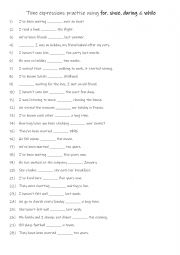
|
A2+B1 Time expressions practise using for, since, during & while
Learning to use for, since, during, and while is important because these words help student�s express time accurately in English, especially when talking about the duration and timing of events. For indicates the length of time an action takes place, while since pinpoints when an action started and continues until now, helping to show continuity. D...
Level: intermediate
Age: 9-100
Type:
Downloads: 101
|
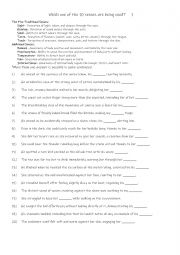
|
Which one of the 10 senses is being used 1
Learning about the traditional and additional senses helps students understand how humans perceive and interact with the world. It highlights how senses like sight, hearing, smell, taste, and touch, along with balance, proprioception, and temperature, provide essential information for navigating and responding to our environment. This knowledge is ...
Level: elementary
Age: 9-100
Type:
Downloads: 118
|
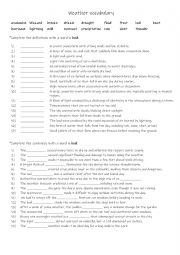
|
B1-B2 Weather vocabulary
Students read the 17 weather related words and in the first part match the words to their definitions. In the second part they read the sentences and use the correct word to complete the gap-fill sentence. Answers on page 2.
Level: intermediate
Age: 8-100
Type:
Downloads: 129
|
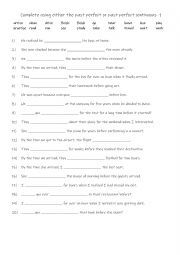
|
Complete using either the past perfect or past perfect continuous 1
First, students need to familiarise themselves with the 2 tenses and their use. Then they read the sentences to see which tense is needed to complete the sentence. Each tense is used 10 times! Answers on page 2.
Level: intermediate
Age: 9-100
Type:
Downloads: 119
|
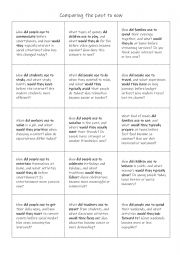
|
Comparing the past to now
25 generic questions relating to the past. For pair work or small groups.
Level: elementary
Age: 9-100
Type:
Downloads: 108
|
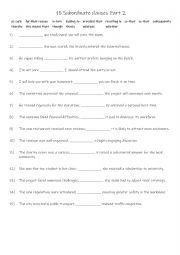
|
A2-B1 15 Subordinate clauses Part 2
Using subordinate clauses allows for more complex and nuanced sentences, helping to convey ideas clearly and effectively. Mastery of subordinate clauses can enhance writing style, making it more sophisticated and engaging. Subordinate clauses help clarify relationships between ideas, such as cause and effect or conditions, making arguments and nar...
Level: intermediate
Age: 9-100
Type:
Downloads: 103
|
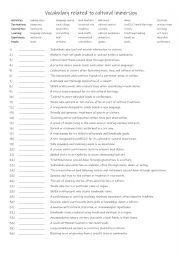
|
A2+-B1 Vocabulary for cultural immersion
Students familiarise themselves with the 30 words and their meanings, then they read the definitions to work out and write in the space provided which one is being described. Answers on page 2.
Level: intermediate
Age: 10-100
Type:
Downloads: 104
|
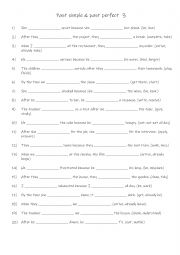
|
Past simple & past perfect 3
Learning the past simple and past perfect tenses is crucial for students as it helps them communicate clearly about past events, showing when actions occurred and how they relate to one another in time. Mastering these tenses improves storytelling, writing, and speaking, enabling students to convey events in a logical and nuanced way. Additionally,...
Level: elementary
Age: 9-100
Type:
Downloads: 109
|
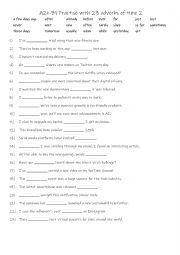
|
A2+-B1 Practise with 23 adverbs of time 2
First, students need to familiarise themselves with the 23 time expressions and their use. Then they read the sentences to work out which one is needed to complete the gap-fill. Answers on page 2
Level: elementary
Age: 10-100
Type:
Downloads: 104
|
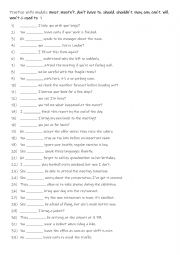
|
A1+-A2 Practise with modals must, mustn�t, don�t have to, should, shouldn�t, may, can, can�t, will, won�t & used to 1
Practising modals like must, should, can, and used to is essential for students as it enhances their ability to express necessity, advice, permission, and past habits. This not only improves their grammar and sentence construction but also builds confidence in real-life communication, whether giving instructions, making requests, or discussing poss...
Level: elementary
Age: 9-100
Type:
Downloads: 102
|
|
|
|
|












